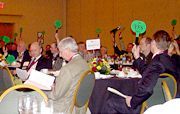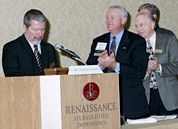It’s a new year and many chiropractors are evaluating what will enhance their respective practices, particularly as it relates to their bottom line. One of the most common questions I get is: “Do I need to be credentialed to bill insurance, and what are the best plans to join?” It’s a loaded question – but one every DC ponders. Whether you're already in-network or pondering whether to join, here's what you need to know.
More Positive Changes at the "New" National Board
The meeting featured the ratification of several bylaws changes, updates regarding improvements in the examination process, and the re-election of the executive committee and one district director.
Bylaws Changes
NBCE delegates re-examined five bylaws proposals, the most significant of which involved the creation of term limits. Term limits were created for directors, and eligibility requirements and terms of service were re-clarified for district directors and FCLB-appointed directors.
In his report to the delegate body, NCBE President Vernon Temple, DC, thanked the delegates and alternates for their time and dedication to the NBCE. Each year at the annual meeting, delegates vote on bylaws and leadership issues that allow the NBCE to grow and change, always concentrating on the true mission of the organization. Dr. Temple told the delegates, "Your participation allows us to evaluate our direction and tell us what we must do to meet current licensure requirements."
Examination Improvements

Dr. Temple reported that the NBCE and the Association of Chiropractic Colleges recently met to address modernization of the Part IV eligibility requirements. The inability of the examinees and chiropractic colleges to have flexibility in scheduling their exams is the number-one complaint the NBCE hears. This causes many doctors to graduate and then wait months before they can begin practice. This delay might increase loan default rates. Changes to these requirements also will allow colleges to implement innovative curricula changes.
The board is moving forward with modifying and updating the Part IV eligibility requirements, which will allow more exam scheduling flexibility. The NBCE's updated eligibility requirements for possible implementation in 2009 would address these problems. Instead of relying on the passage of Part II, the NBCE will require chiropractic college registrars to verify examinees' eligibility to take Part IV. This ensures the examinee has the clinical and education exposure and knowledge to be ready for Part IV and allows for greater flexibility in the examinee's navigation through the exams.

Dr. Temple also reported on the new format of Part III, known as "extended matching." Unlike standard multiple-choice questions, which only have one correct answer, Part III exams would feature extended matching questions with several correct answers that would test a doctor's skills at differentiating among diagnoses and diagnostic tests. A group of case-management experts, state board practitioners and college faculty members has developed pilot exam questions for this new format. The trial administrations are proving successful, with students, schools and instructors providing very positive feedback. The NBCE has tentatively scheduled the new format of Part III to be fully introduced to colleges and examinees in 2009.
Additionally, Dr. Temple discussed the redevelopment of Part IV. The board has appointed Dr. Paul Townsend, NBCE director of practical testing research and development, and Dr. Mark Christensen, NBCE assistant executive director and director of testing, the task of addressing validity of all exams. The Part IV team is investigating generalizability theory, a testing method that will help ensure the reliability of the examination process. The NBCE is exploring options to more efficiently utilize the objective structured clinical exam (OSCE).
Dr. Temple also covered fairness in testing. Providing test accommodations for doctors with physical or learning disabilities, whether lifelong or temporary, is just one way the NBCE seeks to provide fair testing. Another avenue for ensuring fairness in testing is to provide an environment that minimizes the possibilities of cheating. According to Dr. Temple, the NBCE will continue to improve test site security by utilizing standard screening procedures, much like going through airport screening.
"Let me proudly state that the NBCE is secure; we're producing quality high-stakes exams that are recognized by our profession and by the testing community as exemplary," said Dr. Temple.
Election Results
The NBCE executive committee remains unchanged following the re-election of Drs. Temple, N. Edwin Weathersby (vice president), Theodore Scott (treasurer) and Mary-Ellen Rada (secretary). Dr. Scott also was re-elected as district IV director for a three-year term, representing delegates in Arizona, California, Colorado, Hawaii, Kansas, Nevada, New Mexico, Oklahoma, Texas and Utah.
FCLB Update
Dr. Temple asked NBCE Director-At-Large Dr. Richard Cole to give an update on the NBCE's work over the past year to revitalize its relationship with the Federation of Chiropractic Licensing Boards (FCLB). An ad hoc committee was formed to investigate ways to stabilize the FCLB's funding while ensuring the financial stability of both organizations. Dr. Cole reported on a funding plan that would meet these requirements and stated that the committee's proposals had been received and discussed by the full board and a proposal will be finalized within the next several months.
Note: For background information on recent reform efforts at the National Board of Chiropractic Examiners, read our exclusive interview with Dr. Temple, conducted prior to last year's meeting (www.chiroweb.com/archives/25/09/12.html) and our report on the 2007 annual meeting (www.chiroweb.com/archives/25/13/13.html). The 2007 report includes a link to more than 20 articles published in DC since 1999 regarding NBCE activities and reform efforts.


